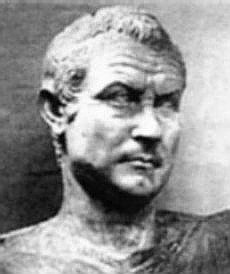- Pseudolus
Infobox_Play | name = Pseudolus

caption = Plautus
writer =Plautus
characters = Pseudolus, slave of Callidorus
Callidorus
Simo, father of Callidorus
Callipho - neighbor of Simo
Phoenicium, prostitute
Ballio, Phoenicium's pimp
Harpax, slave of an officer
Charinus, Callidorus' friend
Simia, slave of Charinus
Young Slave, of Ballio
Cook
Courtesans
Attendant Slaves
setting = a street in Athens, before the houses of Simo, Callipho, and Ballio"Pseudolus" is a play by the ancient Roman playwright Titus Maccius Plautus. It is one of the earliest examples of
Roman literature . The play begins with the shortest prologue of any of the known plays of Plautus.Plot synopsis
Callidorus, the young son of the Athenian nobleman, Simo, laments to his slave Pseudolus, a clever fellow, about how his love, Phoenicium, has just been sold to the Macedonian general Polymachaeroplagides by her pimp, Ballio, for twenty silver coins, five silver coins of which is to be delivered that day by messenger. Pseudolus promises his young master that he will solve his problem. An interaction between Ballio and Pseudolus and Callidorus heightens Ballio's awareness regarding trickery on the part of Pseudolus. Afterwards, Pseudolus then asks Callidorus to produce a loyal friend who would be able to help in his plan. Pseudolus then runs into Simo and one of Simo's friends. Simo has heard that his son has fallen for a
prostitute and is trying to raise the money to buy her freedom. Simo makes a bet with Pseudolus that Callidorus will not successfully save Phoenicium from servitude to the tune of 2000 drachmae. Meanwhile, Ballio is running around town making birthday preparations (today is his birthday), and he is talking to a cook whom he has just hired. While Ballio is away from home, Pseudolus intercepts the messenger, Harpax, sent to deliver the last 500 drachmae, and retrieve Phoenicium. Pseudolus claims to be Ballio's slave, Syrus, and tries to receive the money on his behalf, but Harpax refuses, having been ordered to deliver the money to Ballio alone. Nevertheless, Pseudolus successfully deflects the messenger to a nearby inn where he is instructed to await word from Ballio. Later, Callidorus eventually produces a loyal friend to Pseudolus, although he is not very clever, and not really what Pseudolus was hoping for. Nevertheless, during the exchange, it is revealed that there is a new slave about that very few people in Athens knows about, as he is a foreigner, and he is reportedly incredibly intelligent. Pseudolus then instructs this slave to retrieve the 500 drachmae and the letter from the Macedonian General from the messenger while he is asleep and to impersonate Harpax while meeting with Ballio. After this meeting takes place, Ballio runs into Simo and they talk about how Callidorus must be crushed that Phoenicium is on her way to the Macedonian General. Ballio then meets the real Harpax, whom he takes to be one of Pseudolus' friends, and tells him to scram. In the end, Callidorus gets the girl, Ballio has to repay the real Harpax, and Pseudolus wins the bet with Simo. Simo and Pseudolus go out drinking together in the end.Themes
*The clever slave - Pseudolus is an example of the
stock character of theclever slave , common in Plautus' works.Adaptations
"
A Funny Thing Happened on the Way to the Forum " - The basic plot, as well as the character PseudolusExternal links
* [http://www.perseus.tufts.edu/cgi-bin/ptext?doc=Perseus%3Atext%3A1999.02.0045 Latin text of Pseudolus, from the Perseus Digital Library]
Wikimedia Foundation. 2010.
